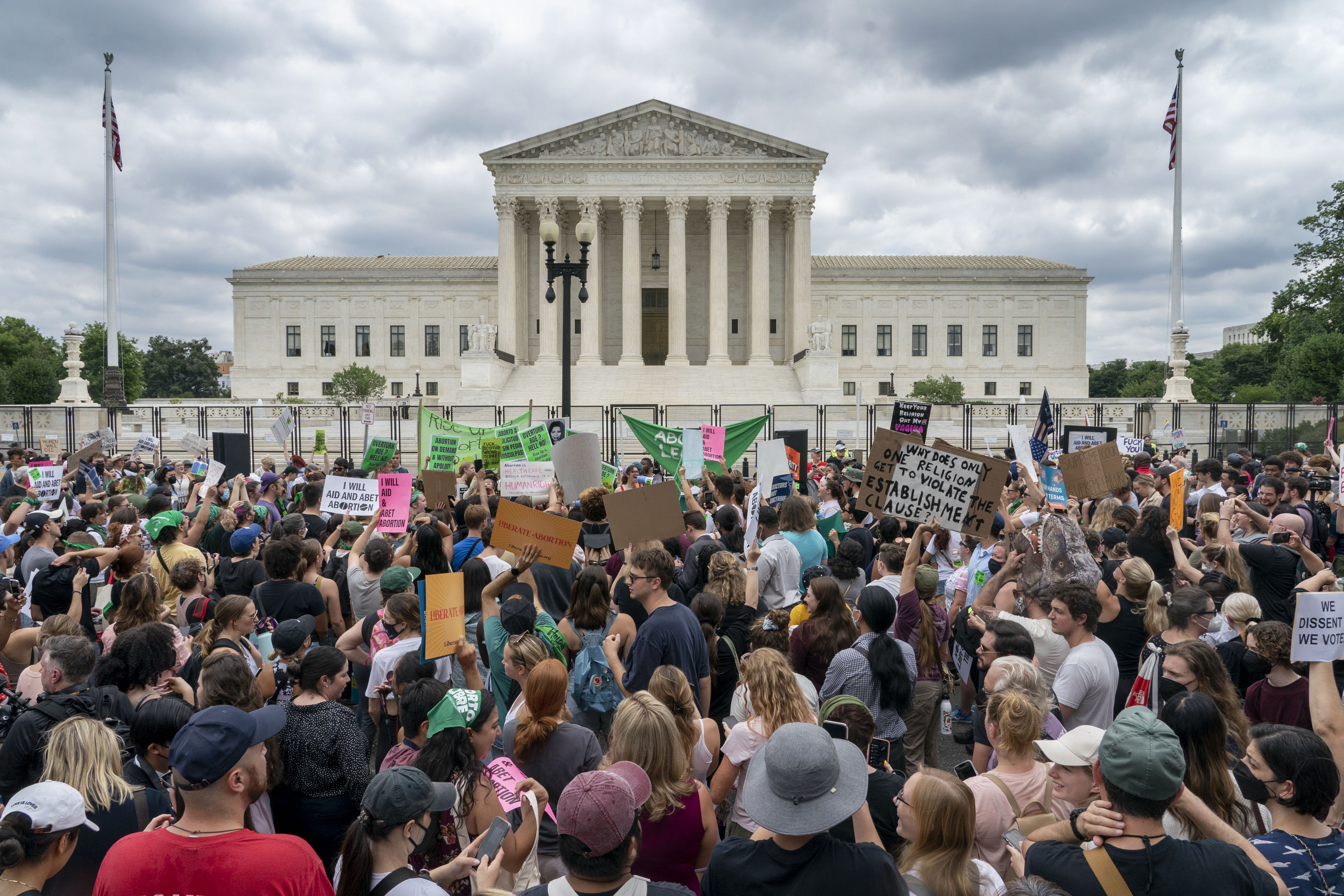
The United States Supreme Court has overturned Roe v Wade, the landmark 1973 ruling that legalised abortion across the country.
The decision in Dobbs v Jackson Women’s Health Organization upheld a Mississippi law that bans abortion after 15 weeks of pregnancy, a period considerably shorter than than that outlined in Roe and subsequent supreme court precedents.
The 6-3 decision sends the overall question of abortion legality in the US to states, removing federal protections.
About half of those states are expected to pass near-total or partial bans on abortion in the coming days, according to the Guttmacher institute, which are in turn projected to disproportionately affect poor women and women of colour.
This ruling could also open the door for the court to reconsider access to contraception.
Here are five takeaways from the ruling:

Conservative justices say abortion not protected by constitution
At the heart of the majority opinion is the argument that abortion is not explicitly protected in the US constitution.
The Roe v Wade ruling had reasoned that a right to an abortion stems from a right to privacy grounded in the first, fourth, fifth, ninth and 14th amendments.
“The Constitution makes no reference to abortion, and no such right is implicitly protected by any constitutional provision,” wrote Justice Samuel Alito, who was joined by conservative Justices Clarence Thomas, Neil Gorsuch, Brett Kavanaugh and Amy Coney Barrett.

The justices’ ruling also rejected that a right to obtain an abortion was “rooted in the nation’s history and tradition” or that it was protected as part of a “broader entrenched right” to autonomy.
The justices said the issue should instead be decided by legislators.
“It is time to heed the Constitution and return the issue of abortion to the people’s elected representatives,” Alito wrote.
Liberal justices say US has ‘lost a fundamental constitutional protection’
The three liberal justices on the US Supreme Court responded with “sorrow” to the ruling in their dissent, saying the “draconian” decision will turn back women’s rights as “free and equal citizens”.
“The majority would allow states to ban abortion from conception onward because it does not think forced childbirth at all implicates a woman’s rights to equality and freedom,” the justices wrote. “Today’s court, that is, does not think there is anything of constitutional significance attached to a woman’s control of her body and the path of her life.”
The justices added that Roe v Wade, and the subsequent 1992 ruling Planned Parenthood of Southeastern Pennsylvania v Casey, sought to strike a “balance” amid “profoundly different views about the ‘moral[ity]’ of ‘terminating a pregnancy, even in its earliest stage’.”
“Today, the court discards that balance.”
Thomas argues access to contraception, gay rights should be questioned
Justice Clarence Thomas in his concurring opinion called into question whether other rights previously ruled on should be reconsidered.
He cited three major cases, establishing rights to contraception, same-sex consensual relations and same-sex marriage writing they “were demonstrably erroneous decisions”.
While he said he agreed with the majority that nothing in Friday’s decision “should be understood to cast doubt on precedents that do not concern abortion”, he wrote the court “should reconsider” the three decisions saying “we have a duty to correct the error established in those precedents.”
Chief Justice John Roberts says ruling ‘unnecessary to decide the case before us’
Chief Justice John Roberts, a conservative-leaning justice who has become the bench’s defacto swing vote, sided with the majority on deciding the Mississippi case, but said their decision did not need to extend to overturning Roe.
“The Court’s decision to overrule Roe and Casey is a serious jolt to the legal system – regardless of how you view those cases,” Roberts wrote in a separate opinion.

“The [majority’s] opinion is thoughtful and thorough, but those virtues cannot compensate for the fact that its dramatic and consequential ruling is unnecessary to decide the case before us,” he wrote.
‘The morning-after pill? IUDs? In vitro fertilization?’: Liberals question what comes next
In their dissent, Justices Stephen Breyer, Sonia Sotomayor and Elena Kagan warned the court’s decision could have implications that could affect forms of birth control and in vitro fertilization.
“Further, the Court may face questions about the application of abortion regulations to medical care most people view as quite different from abortion,” they wrote. “What about the morning-after pill? IUDs (intrauterine birth control device)? In vitro fertilization?”
In vitro fertilization has come into particular focus in the debate surrounding abortion in the US, with the process at times involving discarding excess embryos or destroying fetuses in a pregnancy to increase chances of success.
Liberal justices warn of wider rights backslide
The liberal justices also warned that the majority’s reasoning – that abortion is not explicitly protected in the US constitution – risks a wider rights backslide.
“According to the majority, no liberty interest is present – because (and only because) the law offered no protection to the woman’s choice in the 19th century,” they wrote, referring to the addition to the constitution of the 14th amendment, which said no state shall “deprive any person of life, liberty, or property, without due process of law”.
“But here is the rub,” they wrote. “The law also did not then (and would not for ages) protect a wealth of other things.”
“It did not protect the rights recognised in Lawrence and Obergefell to same-sex intimacy and marriage. It did not protect the right recognised in Loving to marry across racial lines,” they wrote.
“It did not protect the right recognised in Griswold to contraceptive use. For that matter, it did not protect the right recognised in Skinner v Oklahoma…not to be sterilised without consent,” they wrote.
They added: “It is impossible to understand (as a matter of logic and principle) how the majority can say that its opinion today does not threaten – does not even ‘undermine’ – any number of other constitutional rights.”







